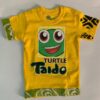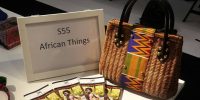Sustainable Fashion: Supporting Local Artisans and the Environment
INTRODUCTION
Sustainable fashion is the practice of creating clothing and accessories in a way that is environmentally friendly, socially responsible, and economically viable.
– AFRICAN THINGS AND ITS MISSION
With a rich ocean of society and social empowering products, African Things enables wealth creation for small retail businesses and aim to have African products in households across the world. African Things aspires to be the leading exporter of African products. Our ultimate goal is to create an enabling environment for African businesses, aiding in the wealth creation for the continent.
Local artisans are of massive importance in this industry; they use their skills and put their heart and soul into creating each garment. Some examples of artisan crafts include handloom weaving, embroidery, block printing, and natural dyeing.
THE ENVIRONMENTAL IMPACT OF FAST FASHION
The fast fashion model is so-called because it involves the rapid design, production, distribution, and marketing of clothing, which means that retailers are able to pull large quantities of greater product variety and allow consumers to get more fashion and product differentiation at a low price.
ENVIRONMENTAL CONSEQUENCES OF FAST FASHION
– WATER WASTAGE
The fashion industry is the second largest consumer industry of water, requiring about 700 gallons to produce one cotton shirt and 2000 gallons of water to produce a pair of jeans; also cautions that textile dyeing is the world’s second-largest polluter of water.
– MICRO PLASTICS
Brands use synthetic fibers like polyester, nylon and acrylic which take hundreds of years to biodegrade.
– ENERGY WASTAGE
The production of making plastic fibers into textiles is an energy-intensive process that requires large amounts of petroleum and releases volatile particulate matter and acids like hydrogen chloride.
AFRICAN THING’S COMMITMENT TO SUSTAINABILITY
African Things has been committed and dedicated to ensure sustainable fashion by ensuring the following:
– USE OF ECO-FRIENDLY MATERIALS
African Things uses renewable sources like solar to power the production unit. Converting sun’s energy into electricity, thereby leave the environment healthy and free from pollution.
– ETHICAL PRODUCTION PROCESSES
At African Things, products manufacturing process prioritizes good health for all parties involved, including the environment, workers, and consumers.
– FOCUS ON QUALITY AND DURABILITY OVER QUANTITY
Our products emphasizes class, luxury and quality. Durability and customer satisfaction is our uttermost goal.
SUPPORTING LOCAL ARTISANS
Supporting these local artisans will not only promote sustainability and help preserve traditional craftsmanship but also foster a sense of community and connection. When you choose to buy handmade clothing from local artisans, you are getting something truly unique for yourself and making a positive impact on the industry as a whole.
– PRESERVATION OF TRADITIONAL CRAFTS AND TECHNIQUES
African Things is devoted in the preservation of our rich traditional crafts. You can support us by purchasing and encouraging our artworks.
– ECONOMIC BENEFITS FOR LOCAL COMMUNITIES
We supply African products to over 30 stores across Nigeria including Spar, Mega Plaza, Terra Kulture, Blenco and more; thereby birthing economic benefits and partnership.
– HOW AFRICAN THINGS COLLABORATES WITH LOCAL ARTISANS
Whether you are looking for quality African products to sell at your store or unique gift items to give at your event, African Things is the partner for you.
– FAIR WAGES AND ETHICAL WORKING CONDITIONS
At African Things, our staffs are well paid and we have offers for wholesalers of African products at amazingly cheap wholesale prices for resale for a good profit margin.
– TRAINING AND SKILL DEVELOPMENT PROGRAMS
African Things offers a comprehensive course designed for beginners and intermediate crafters who want to dive into the world of leather crafting. Register Today.
SUCCESS STORIES AND IMPACT
“Been selling African Things products for over 4 years and they are professional and consistent.” – MEGA PLAZA.
“African Things is ever reliant and always delivers our bags on time, even when we come last minute with a request.” – SOCIAL PERFECT.
Amazing products, was delivered on time and our client just loved the souvenirs we distributed. – DIGITAL JEWELS.
– INCREASED INCOME AND IMPROVED LIVING CONDITIONS
African Things sales partnership and commission offers has improved the standard of living for many local artisans and thereby fostering a world where their creative ideas are not stopped for the lack of good income.
– GROWTH AND EXPANSION OF LOCAL BUSINESSES
It’s interesting to know that African Things has been responsible for the growth of 30 stores across Nigeria including Spar, Mega Plaza, Terra Kulture, Hubmart, and more.
– POSITIVE ENVIRONMENTAL IMPACT OF SUSTAINABLE PRACTICES
Environmental sustainability provides huge benefits for human health and that of all other species. It reduces our global carbon footprint and reduces our reliance on fossil fuels and other harmful energy practices.
– REDUCTION IN WASTE AND POLLUTION
African Things produces less waste, which has helped increase revenue and made them a better choice for eco-conscious customers.
– CONSERVATION OF NATURAL RESOURCES
In the pursuit of sustainable fashion African Things choice of materials is playing a crucial role in safeguarding the planet’s biodiversity.
By making more informed and sustainable purchasing decisions, consumers can demand change from fashion brands and promote a more sustainable future for the industry.
– THE POWER OF CONSCIOUS PURCHASING DECISIONS
Consumers have the power to drive meaningful change. By making informed choices, supporting ethical brands, and adopting sustainable practices.
– IDENTIFYING AND SUPPORTING SUSTAINABLE BRANDS
To determine if a brand is genuinely sustainable, consider these key factors:
1. Transparency
2. Eco-Friendly Materials
3. Ethical Labor Practices
4. Reduced Carbon Footprint
– Nigeria is experiencing a significant transformation as it fully embraces the ‘Made in Nigeria’ ethos, supporting African Things is one of the ways to keep this transformation legacy alive, every sale made translates to a better Nigeria.
CONCLUSION
– Sustainable fashion minimizes environmental impact by using eco-friendly materials and ethical production practices. It helps reduce waste, pollution, and resource depletion. Supporting local artisans further promotes sustainability by fostering local economies, preserving traditional crafts, and reducing the carbon footprint associated with long-distance transportation. Together, these practices contribute to a more ethical and environmentally responsible fashion industry.
– African Things demonstrates its commitment to sustainability and ethical practices through several key strategies:
1. Eco-Friendly Materials: The brand prioritizes the use of sustainable materials, such as organic cotton, recycled fabrics, and natural dyes, reducing environmental impact.
2. Ethical Production: Emphasizing fair labor practices, “African Things” ensures that artisans and workers are paid fairly and work in safe conditions.
3. Local Sourcing: By supporting local artisans and sourcing materials locally, the brand reduces transportation emissions and fosters economic growth within communities.
4. Cultural Preservation: The brand promotes traditional African crafts and techniques, helping to preserve cultural heritage and providing artisans with a platform for their work.
5. Transparency: African Things maintains transparency about its supply chain and production processes, allowing consumers to make informed and responsible choices.
These practices reflect a commitment to both environmental sustainability and social responsibility, reinforcing the brand’s role in promoting ethical fashion.
– Support sustainable fashion by choosing brands that prioritize eco-friendly materials and ethical production practices. Opt for quality over quantity, and invest in timeless pieces that last longer. By making informed purchasing decisions, you contribute to reducing environmental impact and supporting fair labor practices. Your choices can drive change in the fashion industry, making it more responsible and sustainable.
ADDITIONAL RESOURCES
– Here are some helpful resources for further reading on sustainable fashion and ethical consumerism:
– Fashion Revolution’s “What Is Fashion Revolution?
– The Business of Fashion’s “Sustainable Fashion” Section
– Ethical Consumer’s “What Is Ethical Consumerism?”
– The Guardian’s “Ethical Consumerism” Articles
– To purchase products from African Things and support their mission, you can visit their website, African Things and explore a wide range of items. Their product categories include fashion items, home decor, corporate gift items, school bags, and more, all made from traditional African fabrics like Ankara and Adire.
You can buy products either individually or in bulk, with discounts available for larger orders. They also offer wholesale purchasing options, allowing you to resell African products in your own store. Orders can be placed directly through their website or by contacting them via WhatsApp (+2348166725362) for inquiries and purchases.
By purchasing from African Things, you not only get high-quality African-made products but also contribute to their mission of promoting African craftsmanship and empowering local businesses across the continent.








